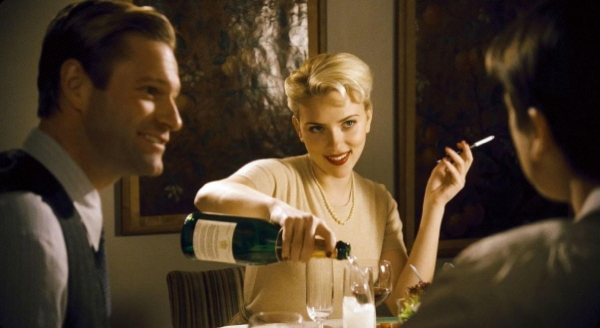Movie review by Greg Carlson
A rather odious piece of genre-worshiping cheese, Brian De Palma’s adaptation of James Ellroy’s novel “The Black Dahlia” is a tremendous disappointment and a near-complete misfire. De Palma, who hasn’t made a truly electrifying movie in a very long time, is the sort of director who insists that every possible shade of gray be excised from his narratives lest his audience miss the thunderous point. Complete with a “Scooby-Doo”-like denouement in which a roomful of wagging tongues explains everything in detail (accompanied by the director’s helpful flashbacks no less), “The Black Dahlia” is a mystery thriller with no thrills and no mystery.
Using the notorious, grisly, and unsolved 1947 Los Angeles murder case of Elizabeth Short as its jumping off point, “The Black Dahlia” constructs a bizarre labyrinth of suspects and clues as it circles around the lurid story of a young woman with alleged ties to prostitution and pornography (links that were discredited in the actual case, but proved far too juicy to leave out of the fictionalized version). It is too bad the titular character doesn’t function as more than the catalyst for the storylines of the cops ostensibly trying to solve her murder, since the only time the movie sparks is when the audience catches glimpses of Short in uneasily voyeuristic reels of going-nowhere-fast screen tests (Mia Kirshner plays Short, De Palma provides the voice of the off-screen director).
Not coincidentally, screenwriter Josh Friedman apes the central triangle of Ellroy’s superior “L.A. Confidential” right down to the defining character traits, substituting Aaron Eckhart for Russell Crowe, Scarlett Johansson for Kim Basinger, and Josh Hartnett for Guy Pearce. Unfortunately, the new movie has none of the subtlety, depth, and intelligence demonstrated in Curtis Hanson’s Academy Award nominee for Best Picture. The chances that “Black Dahlia” will receive any major nominations come Oscar time are exactly zero.
Competing with the ghost of the victim, Scarlett Johansson looks out of place as the woman caught between the so-called “supercops” who watch over her. Like every character in the movie, Johansson’s Kay Lake harbors secrets, but by the time they are revealed, nobody sitting in front of the flickering screen will care. Hilary Swank, trying out a new type of character as well as a Hepburn-tinged accent, fares a bit better as Madeleine Linscott, a twisted rich girl at the center of a creepily dysfunctional family.
One’s enjoyment of the movie might hinge on whether or not you accept Josh Hartnett as a hard-boiled film noir detective. Frankly, nobody is going to claim that the young actor is in the same league as Humphrey Bogart, and the clunky voiceover narration – filled with woozy, period-esque similes and metaphors – has the tendency to inspire more laughter than it does respect. The movie breaks a sweat trying to suggest that dirty, cynical Los Angeles is collectively responsible for Short’s death, but the failure of “The Black Dahlia” lies squarely with De Palma. A good movie about this material might be made one day, but De Palma’s version is not it.
